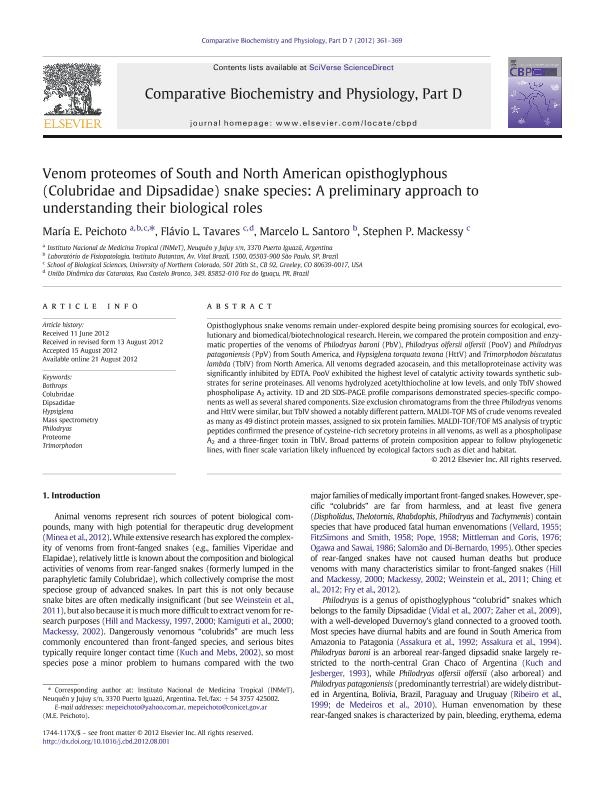Mostrar el registro sencillo del ítem
dc.contributor.author
Peichoto, María Elisa

dc.contributor.author
Tavares, Flávio Luiz

dc.contributor.author
Santoro, Marcelo Larami

dc.contributor.author
Mackessy, Stephen

dc.date.available
2023-05-30T14:29:10Z
dc.date.issued
2012-12
dc.identifier.citation
Peichoto, María Elisa; Tavares, Flávio Luiz; Santoro, Marcelo Larami; Mackessy, Stephen; Venom proteomes of South and North American opisthoglyphous (Colubridae and Dipsadidae) snake species: A preliminary approach to understanding their biological roles; Elsevier Science Inc.; Comparative Biochemistry And Physiology D-genomics & Proteomics; 7; 4; 12-2012; 361-369
dc.identifier.issn
1744-117X
dc.identifier.uri
http://hdl.handle.net/11336/198955
dc.description.abstract
Opisthoglyphous snake venoms remain under-explored despite being promising sources for ecological, evolutionary and biomedical/biotechnological research. Herein, we compared the protein composition and enzymatic properties of the venoms of Philodryas baroni (PbV), Philodryas olfersii olfersii (PooV) and Philodryas patagoniensis (PpV) from South America, and Hypsiglena torquata texana (HttV) and Trimorphodon biscutatus lambda (TblV) from North America. All venoms degraded azocasein, and this metalloproteinase activity was significantly inhibited by EDTA. PooV exhibited the highest level of catalytic activity towards synthetic substrates for serine proteinases. All venoms hydrolyzed acetylthiocholine at low levels, and only TblV showed phospholipase A2 activity. 1D and 2D SDS-PAGE profile comparisons demonstrated species-specific components as well as several shared components. Size exclusion chromatograms from the three Philodryas venoms and HttV were similar, but TblV showed a notably different pattern. MALDI-TOF MS of crude venoms revealed as many as 49 distinct protein masses, assigned to six protein families. MALDI-TOF/TOF MS analysis of tryptic peptides confirmed the presence of cysteine-rich secretory proteins in all venoms, as well as a phospholipase A2 and a three-finger toxin in TblV. Broad patterns of protein composition appear to follow phylogenetic lines, with finer scale variation likely influenced by ecological factors such as diet and habitat.
dc.format
application/pdf
dc.language.iso
eng
dc.publisher
Elsevier Science Inc.

dc.rights
info:eu-repo/semantics/openAccess
dc.rights.uri
https://creativecommons.org/licenses/by-nc-sa/2.5/ar/
dc.subject
BOTHROPS
dc.subject
COLUBRIDAE
dc.subject
DIPSADIDAE
dc.subject
HYPSIGLENA
dc.subject
MASS SPECTROMETRY
dc.subject
PHILODRYAS
dc.subject
PROTEOME
dc.subject
TRIMORPHODON
dc.subject.classification
Bioquímica y Biología Molecular

dc.subject.classification
Ciencias Biológicas

dc.subject.classification
CIENCIAS NATURALES Y EXACTAS

dc.title
Venom proteomes of South and North American opisthoglyphous (Colubridae and Dipsadidae) snake species: A preliminary approach to understanding their biological roles
dc.type
info:eu-repo/semantics/article
dc.type
info:ar-repo/semantics/artículo
dc.type
info:eu-repo/semantics/publishedVersion
dc.date.updated
2023-05-29T12:39:35Z
dc.journal.volume
7
dc.journal.number
4
dc.journal.pagination
361-369
dc.journal.pais
Países Bajos

dc.journal.ciudad
Amsterdam
dc.description.fil
Fil: Peichoto, María Elisa. Governo do Estado de Sao Paulo. Secretaria da Saude. Instituto Butantan; Brasil. Univeristy of Northern Colorado; Estados Unidos. Administración Nacional de Laboratorios e Institutos de Salud "Dr. Carlos G. Malbrán". Instituto Nacional de Medicina Tropical; Argentina. Consejo Nacional de Investigaciones Científicas y Técnicas. Centro Científico Tecnológico Conicet - Nordeste; Argentina
dc.description.fil
Fil: Tavares, Flávio Luiz. Univeristy of Northern Colorado; Estados Unidos
dc.description.fil
Fil: Santoro, Marcelo Larami. Governo do Estado de Sao Paulo. Secretaria da Saude. Instituto Butantan; Brasil
dc.description.fil
Fil: Mackessy, Stephen. Univeristy of Northern Colorado; Estados Unidos
dc.journal.title
Comparative Biochemistry And Physiology D-genomics & Proteomics

dc.relation.alternativeid
info:eu-repo/semantics/altIdentifier/url/https://www.sciencedirect.com/science/article/pii/S1744117X12000457
dc.relation.alternativeid
info:eu-repo/semantics/altIdentifier/doi/http://dx.doi.org/10.1016/j.cbd.2012.08.001
Archivos asociados
